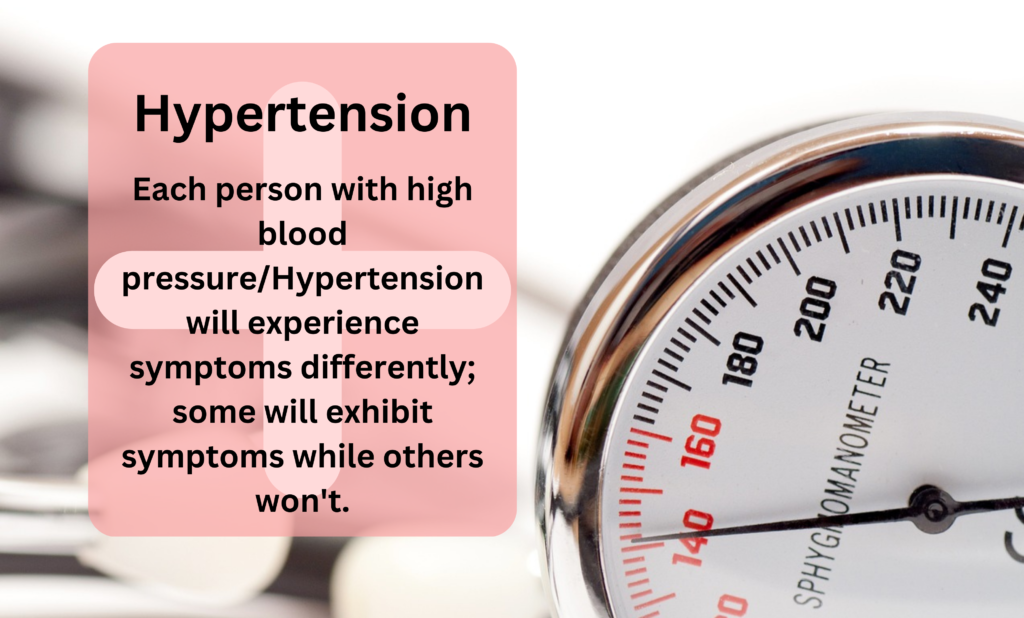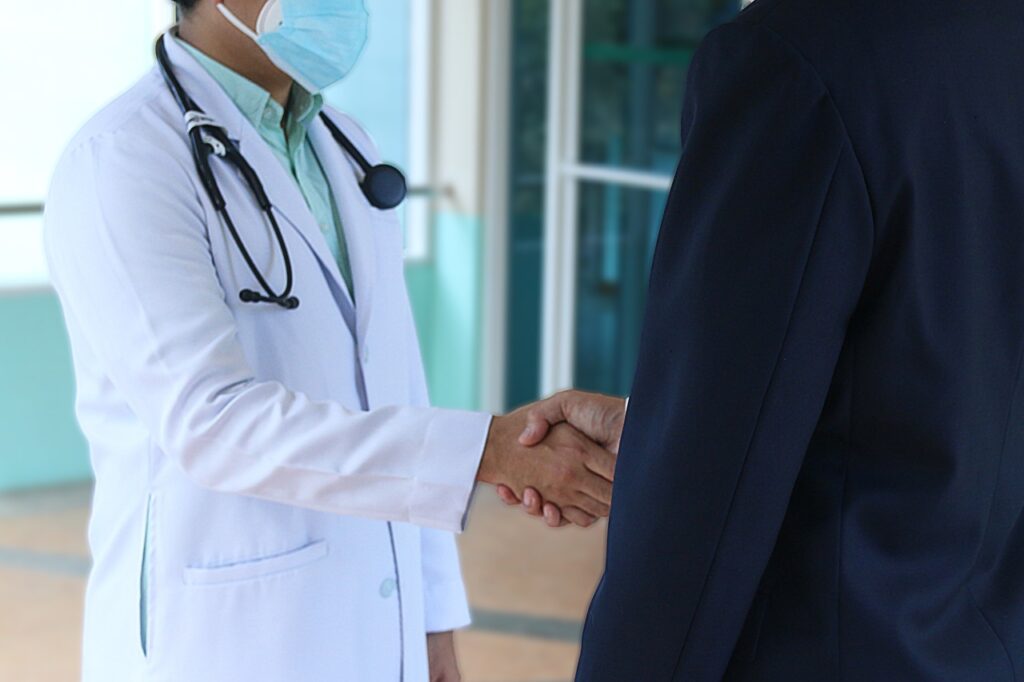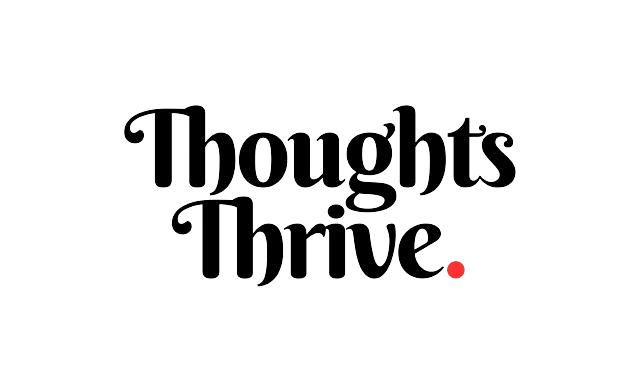High Blood Pressure Symptoms
Each person with high blood pressure/Hypertension will experience symptoms differently; some will exhibit symptoms while others won’t. A person’s unique situation determines how (and when) they encounter symptoms, according to Patrick M. Azcarate, M.D., a cardiologist at Miami Cardiac and Vascular Institute in Florida. “Symptoms can arise at any elevated pressure that is appropriate for an individual’s body,” he continues.
The following are concerning signs of high blood pressure, per Dr. Azcarate:
- Headaches
- Chest pain
- Kidney damage
- Dizziness
- Blurry vision
- Anxiety
- Breathlessness
When a hypertensive crisis—a condition in which the systolic blood pressure normally increases beyond 180 mmHg and the diastolic blood pressure typically rises above 120 mmHg—occurs, these symptoms are more likely to worsen. According to Dr. Azcarate, “Most people don’t feel [these] symptoms until blood pressure gets that high.” “[For] those whose [systolic] blood pressure typically hovers around 90 or 100 mmHg, symptoms may appear if their blood pressure increases to the 140s or 150s.”
Dr. Azcarate notes that there isn’t a certain set of blood pressure values that ensures the experience of associated systems, though. Furthermore, people should routinely have their blood pressure monitored by a healthcare professional as a preventative step because symptoms by themselves aren’t always dependable in leading to an appropriate diagnosis.
The following signs and symptoms warrant seeing a doctor.

1. Headaches
The most common sign of a hypertensive crisis is headaches. In a research examining symptoms associated with hypertensive crises, headaches were reported by 22% of hypertension participants[2].
Hetal Bhakta, M.D., a cardiologist in Palm Springs, California, states that headaches may result from excessive intracranial pressure. A person should see their doctor right away for testing and treatment if their headaches worsen.
2. Chest Pain
Chest pain might occur “if [blood] pressure is too high and the heart’s arteries aren’t receiving enough blood supply,” according to Dr. Bhakta. Chest pain was reported by 27% of patients in the aforementioned study who had a hypertensive crisis.
3. Kidney Damage
Kidney disease can result from or induce high blood pressure. Actually, according to the National Institute of Diabetes and Digestive and Renal Disease[3], high blood pressure is the second most common cause of renal failure in the United States.
According to Dr. Higgins, “high blood pressure can cause the kidneys’ blood vessels to constrict and narrow, which prevents them from working properly.” Kidney disease resulting from narrowed blood arteries impairs the kidneys’ ability to excrete surplus fluid and waste from the body. Extra fluid-filled blood vessels have the potential to raise blood pressure even further, further harming the kidneys and perhaps leading to renal failure.
In patients with chronic kidney disease, arterial (artery-related) stiffness and increased salt sensitivity are two other variables that might cause hypertension.
4. Dizziness
Due to blood vessel damage and narrowing brought on by high blood pressure, dizziness might occur. An earlier source claims that this may jeopardize the blood flow to the inner ear, which is an essential part of the body’s equilibrium regulation mechanism. Consequently, an individual could feel unsteady or dizzy.
5. Blurry vision
According to Dr. Bhakta, elevated blood pressure during hypertensive emergencies can harm the optic nerve and the retina’s blood vessels, which might cause some people to have hazy vision. “Vision problems are typically one of the first noticeable signs of high blood pressure,” he adds, adding that “when the pressure is that high, it interferes with one’s ability to see.”
6. Anxiety
Anxiety is characterized by feelings of unease, dread, and terror. You may start to perspire, experience tension and restlessness, and your pulse rate may quicken. It can be a typical stress response. For instance, you could experience anxiety before an exam, when presented with a challenging issue at work, or before making a big decision.
7. Breathlessness
When someone has trouble breathing, they get short of breath. Breathlessness may result from an elevated cardiac workload brought on by excessive hypertension.
According to John P. Higgins, M.D., a cardiologist with UTHealth Houston’s McGovern Medical School, “High blood pressure can also cause heart attack and heart failure, which can fail to pump all the blood coming from the lungs forward, so blood and pressure back up into the lungs and lead to shortness of breath.”
When to See a Doctor

According to Dr. Bhakta, “You usually won’t know you have hypertension until somebody screens you and finds out your blood pressure is high.” After the age of 18, everyone should go for routine preventative health screenings with a healthcare practitioner, which should include a blood pressure check. The U.S. Preventive Services Task Force suggests having a blood pressure check every three to five years for individuals with normal blood pressure between the ages of 18 and 39. High-risk people might need to get checked out more frequently.
Dr. Bhakta affirms that a blood pressure value of less than 120/80 mmHg is ideal for persons over 20.
Every year, persons at least 40 years old are advised to have their blood pressure checked. Dr. Bhakta says, “As we age, the blood vessels become stiffer, which causes the blood pressure ranges to be a little bit higher.” As a result, at a certain age, elevated blood pressure readings are more common.
Symptoms of high blood pressure should be seen by a healthcare professional right away, regardless of age.
Free blood pressure checks are available to those with limited access to healthcare at specific venues, including retail outlets, pharmacies, and health resource fairs. For example, free public blood pressure machines are available at some Walmart locations. However, the accuracy of the readings produced by these devices depends on the user following the guidelines for using the device.























Comments 2